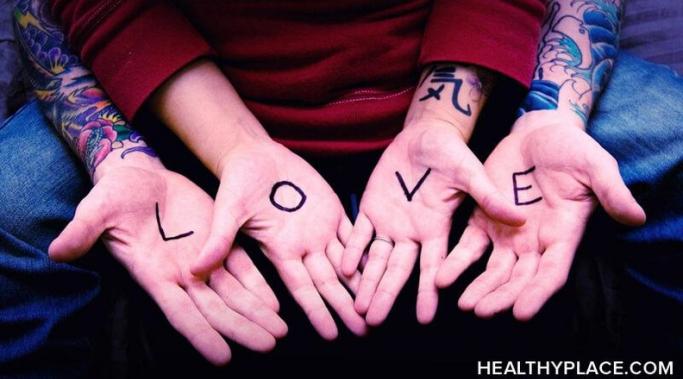Blogs
When I told my mother I had a mental illness, I’m pretty sure she didn’t believe me. She didn’t come right out and say it, but it was pretty clear she was suspicious. Once she did feel something was wrong, she was sure it could be fixed with vitamins and herbs.
It couldn’t.
And this is a pretty common reaction from family members. You have one of the hardest conversations of your life and the family member responds with, “you’re not sick.”
Or, “you look fine to me.”
Or, “you’re just being dramatic.”
Or many other things that will tell you that they don’t believe anything is wrong.
So how do you approach a family member and explain to them that everything is not OK.
I was sixteen and on the edge of puberty when I realized I hated my body. I hated having breasts, and the fact that people actually noticed them. I hated the fact that my stomach was round, my thighs were round, even my hair was too round.
I felt awkward and ugly, and that feeling plagues me to this day as I recover from anorexia.
Whitney Houston's death kept me up Saturday night because my mind was racing. Not only from the shock of a legend being gone, but also the speculation and response from media, but mostly from people on Twitter and Facebook. There is so much misunderstanding, judgment, and blame placed on addicts whom die, and am saddened to not see more compassion for the struggle people face when struggling with an addiction. I know at this point the cause of her death is pure speculation, and I will not try to analyze the how and why in this post, because I feel I do not have enough information to talk about it, without more facts. I do want to address the life and loss of a legend, the realities of a struggle with an addiction, and the frustration and sadness I feel when seeing the responses to her death.
Welcome to Anxiety Schmanxiety Blog!
Jodi is licensed clinical social worker and former anxiety sufferer. She is a counselor, mother, healer, lover, teacher, author and friend. She has been counseling children and adults since 1994, working with folks online and in her office.
No kidding! I am telling you what you already know. I might be telling you how you felt when you opened your eyes this morning. But let's start at the beginning. Let's recall, and sorry to drag you back to this time, the first time you were diagnosed with a mental illness.
The Diagnosis
"Natalie, you have bipolar disorder."
A whopping twelve years old when these words were thrown on the table. My reaction? How exhausting! The years before the diagnosis? Bloody exhausting!
Next: A small amount of relief. Above all, I was sick and tired of being sick and tired but my life wasn't about to get any easier, no, it was time to try on medication's, fingers crossed they worked, and then fall, defeated, beaten, when they did not.
But this isn't my story. It's probably yours as well. Or, it's the story of someone you love. It hurts to watch them suffer.
Side-Effects, Complications, From Medication
Recovering from mental illness involves medication and medication is exhausting.
Teenagers stand on the brink of discovering who they are. It's a magical time, full of opportunity and promise. Teens have the advantage of constant contact with their peers and adult role models via personal phones and the Internet's vast array of video chat, picture sharing, social networking, and all the rest. Teens are connected in ways we couldn't be at their age. Like so many other great possibilities, this connectedness can be both a blessing and a curse.
This time of year, I am always reminded of the first half of 2008--the year I admitted Bob to inpatient psychiatric treatment not once, but twice. I suppose it's because this is the same time of year, or because it's the season when Bob experiences more manic-type symptoms. Apparently, it's on Bob's mind, too.
This month is Teen Dating Violence Awareness and Prevention Month. Why do teens get their own month? The signs and symptoms of teen dating abuse are the same as domestic abuse, so why can't the kids just read our grown-up sites? They've always gotta be so hard-headed!
Every so often, I am reminded that my son Ben still has to work hard to stay focused on the world as we all know it: work, play, conversations, whatever we are watching on TV. Without his medications, that feat is nearly impossible; with treatment, it's certainly easier. But not without effort. Not without strength.
The issue with feeling unlovable. The issue? It can be an issue and pardon me for being redundant here. The topic for this post was derived from a comment a reader made. This person mentioned the word unlovable in the context of mental illness. I quickly scribbled the word down and put it away for a couple days.
I open my day-timer today and see the word, UNLOVEABLE, written in large and bold text by my own hands. I sort of grimaced, watching the rain fall from a gray sky outside my window, and wondered if I really had to put it in bold, I mean, it's not as if I have no experience with feeling unlovable. I feel it often, and if you struggle with mental illness, well, perhaps you do too.
![MP900227716[1]](/sites/default/files/styles/blog_listing/public/uploads/2012/02/MP9002277161.jpg?itok=FWQ27v50)









I believe she will only be able to rid herself of her demons, and hopefully her BPD as well, when she's ready to confront the abuse of her father. If she can put the blame where it belongs, she may stop projecting that victim/perpetrator cycle on the present men in her life. These demons are a metaphor for the purgatory she has created for herself. That reality has consequences in the real world, but it need not be real in the tangible sense. Exorcising her demons will require the expenditure of real physical energy and probably the destruction of aspects of her personality. If this ever happens, and it's possible but not probable, then these demons will evaporate. They are only as real as one's personality is real. In short, reality is not the question, it's what you make of the things you feel to be real.